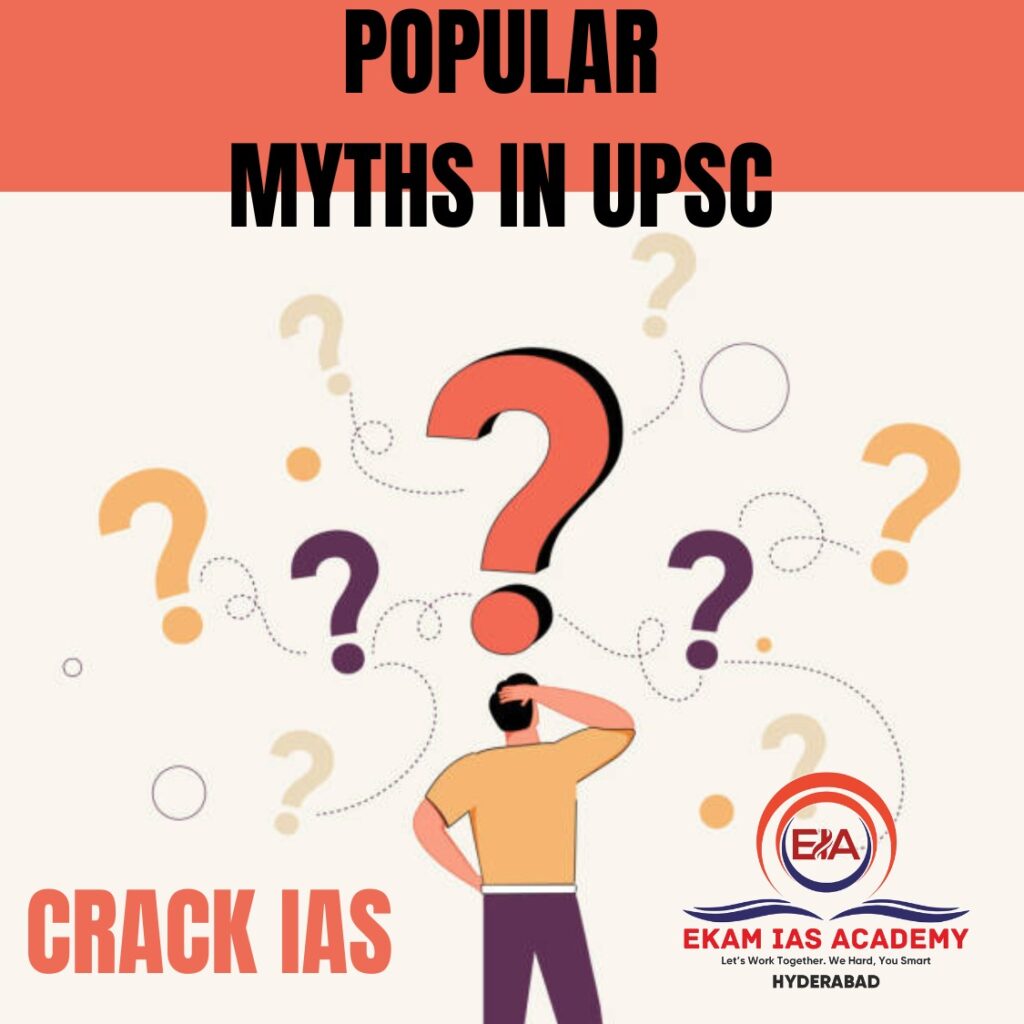MYTHS IN UPSC PREPARATION

MYTHS IN UPSC PREPARATION is known to be the toughest exam in the country. Some of them even call it “the mother of all exams”. Is this tag real?. Let’s find out.
What makes the exam tough? It is primarily the diversity of the topics that a student needs to read, makes it tough. We all agree that we graduate from either the science or the Arts background. The scope of UPSC Syllabus is a unique blend of both arts and science background subjects.
This creates a level playing field for students from both the streams. The Arts students try to master the science subjects and the science students learn to master the arts subjects.
The journey of UPSC begins with an attempt to master the territory which is either unknown or not fully known. This makes the process lengthy. Unlike any other exam, UPSC is an exam of ability to not only comprehend difficult issues, but also a feat of building perspectives about issues surrounding us.
This takes us to the first myth in UPSC preparation, which is, “we need to cram the entire content of UPSC”. This is a false statement. You would agree, it is impossible for anyone to remember such a vast content verbatim (exact). Ironically, the reality is one needs to just know the concept and build a thought process surrounding the concept learned.
While presenting the thought process, a student shall be mindful of the Constitutional Provisions and the general level of societal acceptance. Any aberration (abnormality) from the generally accepted view must be avoided. For Example, in a women centric issue, supporting the cause of upliftment of the women is the safest game to play. This leads us to the next myth, “Only Students with strong Academic background can crack this exam”.
This is probably the biggest myth, as this is the sole reason that keeps a large chunk of student community away from UPSC dream. If we look at the list of students who are cracking UPSC, year after year, it only reveals the lack of truth in this myth. The basic reason that UPSC has asked only 35% marks as qualifying in the graduation is testimony to negate this myth.
Many toppers in the past have come from so called non-descript (undistinguished) schools and colleges. You would be surprised to know, many of them came from Govt aided schools and colleges, with larger part of their academic career in vernacular languages.
The next myth is about the idea that “a UPSC student must know everything under the sun”. This is another myth that have survived across generations. Undeniably, the UPSC syllabus is vast. However, it is having been clearly spelt out and defined by the UPSC. All that is needed is streamlining the preparation according to the syllabus. This myth may be true for Current Affairs, however, missing out on one or two questions, is not an issue in the exam.
Another myth, which most of the institutions en-cash upon is “Coaching is a must”. Surely, coaching helps you in streamlining your syllabus and approach, however, making a statement that, coaching is a must, is a false statement. Every year large chunk of students without any institutional support passes this coveted exam. Hence, it is proved beyond any doubt that coaching is a must. If a student can get a good mentor, even in the absence of coaching, performance can be improved largely in less span of time.
One myth with which I survived throughout my UPSC journey is “a student should study 16 hours a day”. After mentoring and training students for the last 12 years, I have realized that it is not true. Rather than the number of hours, the quality of hours of preparation is what matters. Most of the students struggle to study with concentration, leading to increased number of hours on the study table. If a student can develop the art of concentration, time planning and discipline, anywhere between 6-8 hours is more than enough.
One more myth I have come across on many occasions as a student and as a teacher as well is, “a UPSC aspirant should read many books”. Believe me, this is the gravest of all the myths. When the syllabus is defined, a student must read the most recommended book, with some research support and master the content. There is no requirement to read more than 2 books for each dimension of subject.
There are many such myths about UPSC that build a sense of doubt among the students. If you have the dream to become an IAS/IPS officer, all you need to do is to stay disciplined for 12-14 months with a right strategy.
If you are one of those, who wish to make it big, then we are always there to support you. You can call us anytime and seek personal interaction with our mentors, who shall guide you on the your path of success.
The views expressed are personal, you have every right to defer.
